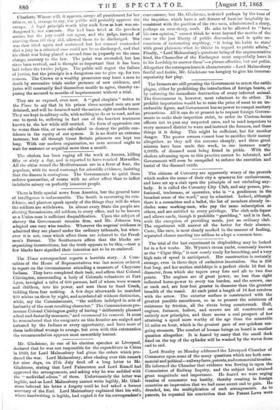Mr. Gladstone, in one of his election speeches at Liverpool,
declared that he was not responsible for the expenditure in China in 1860, for Lord Malmesbury had given the orders which pro- duced the war. Lord Malmesbury, after chafing over this remark for nine days, on 27th July fired off a long letter to Mr. Gladstone, stating that Lord Palmerston and Lord Russell had approved the arrangements, and asking why he was saddled with the "undivided odium" of them. Unfortunately the letter was legible, and as Lord Malmeabury cannot write legibly, Mr. Glad- stone believed his letter a forgery until he had asked a former secretary of the Earl. Lord Malynsabury explained that his wife, whose handwriting is legible, had copied it for his correspondent's convenience, but Mr. Gladstone, irritated perhaps by the tone of the inquiries, which have a sub flavour of hauteur laughably in- consistent with the position of the two men, administered a sharp, perhaps an over-sharp, snub. He asks to be allowed to "have his own opinion," cannot think he went beyond the merits of the case or the just liberty of public discussion, and is quite un- conscious of insinuating anything, "it being his habit to state' with great plainness what he thinks in regard to public attain)." Finally, "Lord Malmesbnry's questions being of the argumentative kind, the Chancellor of the Exchequer must respectfully leave it to his Lordship to answer them"—a phrase effective, but not polite. Altogether the correspondence is characteristic —Lord Malinesbury fretful and feeble, Mr. Gladstone too haughty to give his immense superiority fair play.






























 Previous page
Previous page